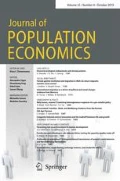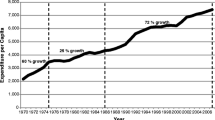Abstract.
This paper evaluates the impact of a recent Norwegian family-policy reform. The reform provides benefits of up to NOK 3,000 (approximately € 400) per month to families with one- to three-year-old children, who do not utilize state-subsidized day-care centres. We investigate the reform’s effect on parents’ labour force participation. We find that, on average, the reform reduced women’s labour force participation and increased the specialization of work between couples. We find that the effect of the reform depends on women’s schooling. Specifically, the labour force participation of highly educated mothers fell by more than that of mothers with less education.
Similar content being viewed by others
Author information
Authors and Affiliations
Corresponding author
Additional information
I am grateful to Associate Professor Espen Bratberg and Professor Alf Erling for their valuable comments. My special thanks to Kjell Vaage, Arild Aakvik and Afsane Bjorvatn for helpful suggestions. This paper was presented in a seminar at the Department of Economics, University of Bergen, Norway. I am thankful to the participants of the seminar for their positive feedback. The paper has also benefited from the reports given by three anonymous referees. I am also thankful to Professor Heather Joshi for helpful remarks on the paper. Responsible editor: Christoph M. Schmidt.
Rights and permissions
About this article
Cite this article
Naz, G. The impact of cash-benefit reform on parents’ labour force participation. J Popul Econ 17, 369–383 (2004). https://doi.org/10.1007/s00148-003-0157-y
Received:
Accepted:
Issue Date:
DOI: https://doi.org/10.1007/s00148-003-0157-y




